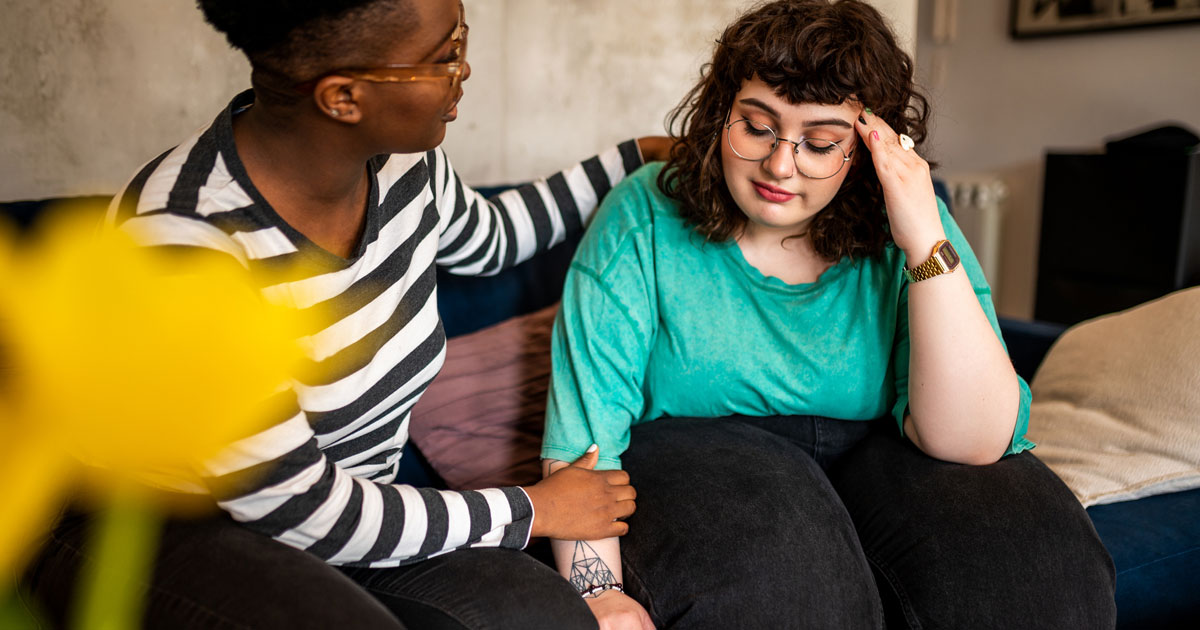What do you do if someone needs help, including SUD rehab, but won’t accept it? One of the best things anyone battling an SUD can do is to seek professional treatment, and most friends and family members want to aid in this process however possible. Unfortunately, getting someone the help they need and deserve isn’t always easy.
Many people with SUD refuse, at least at first, to go to rehab. This brings up a difficult question for many people in the same spot. While it’s important to remember that every person—and every situation—is unique, there are some things you can do to help both yourself and your loved one after they’ve refused treatment.
How Do You Help Someone that Doesn’t Want to Stop Drinking or Using Drugs?
Sometimes, helping someone that doesn’t want to be helped can seem impossible. Whether your loved one doesn’t want to come to terms with their substance use or they don’t understand the scope of their problem, it’s important to take some time to evaluate the actions you’re taking and whether you’re truly helping. To do so, follow these seven tips for dealing constructively with someone who is resistant to your help without overwhelming them or pushing them away.
Educate Yourself

Experiencing a situation where it seems as if someone you love is purposely hurting themselves by ignoring your attempts to help them is never easy. That’s why educating yourself on SUD is so important, both for you and your loved one.
A substance use disorder is considered a mental health disorder. SUD is incredibly complex and can occur for a variety of reasons, from a person’s genetics to a trauma response, a poor coping mechanism, or even self-medication to deal with physical or emotional pain. It’s crucial that you understand the various aspects that can contribute to your loved one’s substance use disorder so you can also do your best to understand why they are struggling. Educating yourself can help you gain a better perspective of a situation that may make you angry or hurt and allow you to understand the sort of help your loved one may need.
Identify Your Role in the Situation
Your role in a substance use disorder situation depends heavily on your relationship with the person that is struggling. It’s important to identify your role so you don’t overstep boundaries while still supporting them in the way they need. Consider how your role as someone’s partner may look different than if you were someone’s parent, child, or close friend.
For example, if you are a parent and have a child that is struggling with alcohol, you may need to decide to stop supporting them financially to slow their substance use. If you are an adult child of a person with SUD, your role may be completely different. Keep in mind, too, that every situation is incredibly different and unique to the people involved. To identify your role, ask yourself questions like whether a relationship with this person is supportive and whether your behavior may enable them. This can help you better understand what you may need to change moving forward.
Identify and Remove Enabling Behaviors
This tip is a critical follow-on tip for Tip 2—if you’ve been approaching your role with your loved one in a way that enables them to continue their substance use, it is critical to evaluate and remove your enabling behaviors. Of course, it’s natural to want to help the people that you love, especially when you know they are struggling. Unfortunately, some of the things you may do to try to help your loved ones may end up enabling them further.
For example, one of the most common enabling behaviors that family members and close friends engage in without realizing the trouble it may cause is funding their loved one’s substance misuse. However, establishing boundaries like not giving money to a close friend who is struggling with SUD can help both your loved one and you. Other enabling behaviors include making excuses for your loved one’s poor behavior, covering for them when they make mistakes, lying to/for them, doing work for them, and even providing them with their substance of choice to minimize conflict. In general, many of the things friends and family members do in an attempt to “help” loved ones with SUD wind up enabling the person to continue to use.
Establish Boundaries
Establishing boundaries is an important way to protect both you and your loved one. Boundaries are essential for any relationship and can help you ensure that you are comfortable and not taken advantage of. Sometimes, when someone is struggling with a substance use disorder, they cross boundaries, whether intentionally or unknowingly. Often, their behavior creates the need for you to establish boundaries in the first place to protect yourself.
It’s crucial that you set firm boundaries with your loved one for your health, both emotionally and physically. If you feel like you need to walk on eggshells around this person, cover or lie for them, or protect them from the consequences of their actions, it’s time for you to create boundaries. Most urgently, if you feel you are in emotional or physical danger due to your loved one’s behavior, you must create boundaries to protect yourself.
Allow Consequences to Occur
Once you establish firm boundaries between you and your loved one and stop enabling behaviors, you will likely notice that they’ve begun to experience consequences of their actions. These consequences are what so many friends and family members have been trying desperately to “help” their loved ones with SUD avoid. However, it is important for all involved to realize that nobody is immune to consequences.
Whether your loved one is fired from their job because you stopped calling in for them or they fall behind on bills without your financial help, it is critical that consequences do occur. While it may hurt to see your loved one struggling, it is also important for them to understand what their actions are doing to both themselves and others. It can be near impossible for people with an SUD to recognize how much their own actions affect others when they’re deep in active substance use. Because of this, consequences can serve as an unfortunate wake up call.
Offer Positive Support and Practice Empathy

One of the best things you can do for someone struggling with substance use disorder, especially when they say they don’t want help, is to simply offer your support. SUD can cause extreme isolation and make people feel like they are alone in their struggle. Sometimes, just offering positive support can mean the world to your loved one.
If you haven’t had conversations about these issues with your loved one before, it’s important to remember to be as empathetic as possible. It can be easy for your loved one to feel attacked and be hurt when you suggest help or insinuate that they are in the wrong. By offering positive support and letting your loved one know you’re there to help them when they’re ready, you are taking steps in the right direction.
Consider Staging an Intervention
Interventions can help your loved one more than you know. An intervention can be done with just a few close family members or someone’s entire friend group—what’s most important is effectively communicating how this person’s actions are affecting others. Using “tough love” is important during interventions because it puts responsibility on the person who has been hurting those around them and emphasizes the importance and urgency of the issue.
In many interventions, friends and family members choose to lay out boundaries and consequences for violating those boundaries. For example, you may tell a partner with SUD that you have established a boundary that involves them not being intoxicated around your children, and that they must seek treatment, or they can no longer live in the same home as the children. Then, be prepared to follow through with the consequences you’ve established. Remember, too, to remind the person how much you love and care for them, and that this is the reason you want them to seek treatment in the first place.
Addiction Rehab FAQs
When you ask a loved one to seek treatment for SUD, they may refuse. Often, refusals are based on three common themes:
- “You can’t make me go.”
- “Rehab doesn’t work, anyway.”
- “I can stop on my own/I don’t need to stop.”
Q: Can You Make Someone Go to Rehab?
A: The answer to this question varies from state to state, as well as from person to person. In some cases, you can send people to rehab involuntarily. This can be done in a few different ways. If you are the parent or legal guardian of a minor under the age of 18, you have the right to make legal decisions regarding their health and well-being. In most states, this also allows you to send your child to rehab for a substance use disorder.
If your loved one is over the age of 18 however, it is much more difficult to try to commit them to treatment without their consent. Some states allow family members to send their loved ones to rehab through a process called involuntary commitment. Involuntary commitment is legal in 37 states and can occur if a person demonstrates that they are unable to take care of themselves, are a threat to themselves or others, or are neglecting their life and duties. The case must usually go through a court to be approved before a person is committed. The state of Maryland does not have outpatient commitment laws and you cannot use involuntary commitment legislation to try and force someone into rehab if they don’t want to go.
One of the only other ways someone can involuntarily be sent to rehab is via a drug court order. For example, this situation can occur when a person is taken into custody for possession, is willing to plead guilty to the nonviolent crime, and accepts rehab in lieu of other penalties. However, this method only works for some substance use disorders and isn’t helpful for people struggling with alcohol.
Q: What Percentage of Users Relapse After Rehab?
A: Some sources claim that as many as 30+ percent of alcohol users and as many as 80% of illicit drug users relapse after completing rehab. However, this statistic simply isn’t reliable, as there is no true way to document how many people relapse. Even documented relapses do not account for the type of treatment program experienced, repeat experiences in rehab, or the eventual recovery of many individuals after subsequent treatment.
In addition, for many people, relapse is a part of the recovery process. Most importantly, relapse does not mean the person has “failed.” Relapse does not erase the recovery tools and resources gained during SUD treatment and should not be a reason to avoid going to rehab.
Q: Can People Stop Using Substances on Their Own?
A: When someone with SUD ceases use of that substance on their own, they will almost inevitably experience physical and mental withdrawals. These are extremely difficult to manage alone, without medical intervention. In some cases, as with alcohol or benzodiazepines, withdrawals can cause seizures and even become fatal.
In addition, SUD is often co-occurring with mental health disorders, trauma, and other physical health problems. For that reason, while being willing to stop using drugs or alcohol is a positive sign, it is very hard to accomplish alone. Encourage your loved one as much as possible but remember that it is critical they stay safe while curbing substance use.
Getting the Help Loved Ones Deserve

If you know someone in need of substance use disorder treatment, find them help as soon as possible. When that time comes, it’s natural to want to help in whatever way you can. Whether you’re a family member, friend, or partner of someone with SUD, worrying about someone you love can be both emotional and exhausting.

Experienced Chief Executive Addiction Recovery and Mental Health Professional
Business professional in the Addiction Recovery and Mental Health industry for the past 26 years. Caring, compassionate and strongly motivated to make a difference in the organizations I am affiliated with and welfare of the population we serve. Currently focused on advocating, educating and developing projects leveraging evidence based, real time technology to support individuals in recovery.


